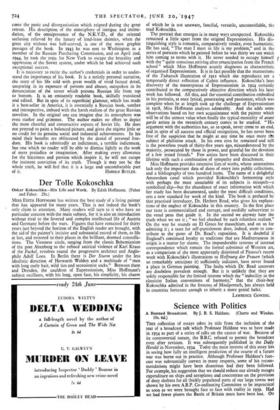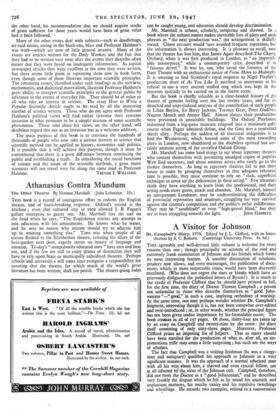Science with Politics
THIS collection of essays takes its title from the inclusion of the text of a broadcast talk which Professor Haldane was to have made in 1934 as part of a series of talks on the causes of war. Because of its controversial nature, the B.B.C. refused to permit the broadcast even after revision. It was subsequently published in the Daily Herald in November, 1934. Today the main interest of this essay lies in seeing how fully an intelligent prediction of the course of a future war was borne out in practice. Although Professor Haldane's fore- cast was substantially correct in many respects, some of his recom- mendations might have been disastrous had they been followed. For example, his suggestion that we should reduce our already meagre expenditure on ships and aeroplanes and concentrate on the provision of deep shelters for all thickly populated parts of our large towns was shown by his own A.R.P. Co-ordinating Committee to be impractical as soon as we were brought face to face with reality in 1939. Had we had fewer planes the Battle of Britain must have been lost. On
the other hand, his recommendation that we should acquire stocks of grain sufficient for those years would have been of great value had it been followed. • _
Many of the other essays deal with subjects—such as doodlebugs-, air-raid noises, seeing in the black-out, blast and Professor Haldane's war work—which are now of little general interest. Many of the essays are articles written for the Daily Worker, and the fact that they had to be written very soon after the events they describe often meant that they were based on inadequate information. As topical newspaper articles they were excellent at the time they were written, but there seems little point in reprinting them now in book form, even though some of them illustrate important scientific principles. The remaining essays, classified under such. headings as the universe, mathematics, and dialectical materialism, illustrate Professor Haldane's great ability to interpret scientific principles to the general public by reference to the events of everyday life. They should be of value to all who take an interest in science. The essay How to Write a Popular Scientific Article ought to be read by all . the increasing number of science writers. Those who do not agree with Professor Haldane's political views will find rather tiresome their constant intrusion in what promises to be a simple account of some scientific phenomena. Those who share his views, on the other hand, will doubtless regard this not as an intrusion but as a welcome addition.
The main purpose of this book is to convince the hundreds of thousands of people who now take a serious interest in science• that scientific method can be applied to history, economics and politics. It is possible thit it will achieve this purpose, though it must be remembered that there is a great difference between convincing the public and establishing a truth. In considering the social functions of science and the scope of the -scientific methods, a great many scientists will not travel very far along the same road as Professor



































 Previous page
Previous page